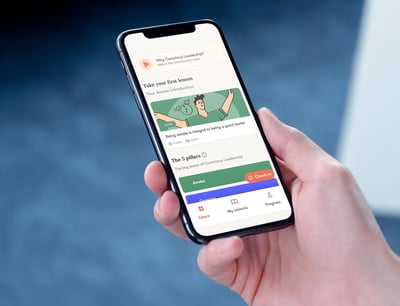6 Essential Leadership Skills to Develop for a Hybrid Work Environment

One of the skills that is essential for any leader is the ability to adapt to change. This has certainly been true during the COVID-19 pandemic, as many businesses have had to pivot to a hybrid work model. Employees have had to learn new ways of working, and leaders have had to find ways to motivate and engage their teams from afar.
In the modern business world, there is no longer a clear line between work and home and more and more people are working in a hybrid way - working between home and the office. And while this can be great for flexibility and balance, it also demands new skills from leaders to manage a team that is constantly dispersed.
Here are six essential leadership skills for managing a hybrid work environment.
New Ways to Communicate
Effective communication is essential for any leader. It helps to establish a common purpose, promotes goal alignment, and allows for the open discussion of sensitive issues. However, it can be easy to become fatigued by constant planned communication. That is why a mix of formal and informal communication is important, discussing work and deliverables while also creating the space to talk about ‘less productive’ things. We’ve lost the chance to bond and connect in the workplace and constant Zoom calls aren’t helping. Making time to catch up on each other's day-to-day lives may seem like wasting time but it creates trust which is the glue that binds the highest performing teams together.
This trust is the foundation upon which effective leadership skills are built. By taking the time to speak with and regularly connect with the team, Conscious Leaders build strong relationships, promote collaboration, and achieve success.
Related Reading: 7 Ways to Develop Your Leadership Skills in a New Role
Inclusivity and Empathy
Many people enter the workforce assuming that their colleagues will be inclusive and understanding. However, inclusive work environments don't happen automatically. Leaders must be conscious of the signs of isolation and try to connect with employees.
Employees can feel isolated for many reasons, such as working remotely or feeling like they don't fit - this can be perceived or real. Marginalised groups can especially feel like they don't belong. Conscious Leaders need to have empathy for these unique situations and make an effort to include everyone. When employees feel connected and engaged, they're more productive and loyal to the company.
Good leaders create a positive work environment where everyone feels valued. So any necessary skills for leadership development should focus on building empathy and inclusion skills. It's not enough to be a technically competent leader — you also need to be able to connect with your team on a human level. Isolated employees can quickly become disengaged, so it's crucial to prioritise inclusion. That doesn’t mean running inclusion workshops and creating new steering committees, it means noticing everyone in your team, listening to them, and creating many opportunities for the team to come together to speak openly and honestly about their challenges, in order to solve them together.
Take our quiz to see whether you and your team would benefit from the Conscious Leadership psychometric.
Resolving Conflicts
An incredibly important skill, not to be forgotten in leadership development, is the ability to resolve conflict. Conflict is inevitable in the workplace and can be a good thing. It allows us to air important differences and build better relationships. When we handle conflicts well, we create healthy debate, and invite counterviews, while ensuring everyone still feels safe and supported. .
However, conflict can also have a dark side. When left unresolved, it can fester and grow, becoming more destructive over time. This is why it's so important for leaders to look out for conflict actively and demonstrate courage to tackle it head-on. With the right skills, leaders can turn conflict into an opportunity for growth and transformation.
While some people may shy away from conflict, it's essential to view it as an opportunity to grow and develop your skills as a Conscious Leader. When faced with conflict, look for ways to unite the team instead of pitting people against each other or looking at where to apportion blame.
Learn to see both sides of the issue and look for common ground. And most importantly, don't be afraid to make yourself clear when it comes to pointing out the behaviour that is not going to help the team. Unless people understand what is and isn’t acceptable, they may feel they are doing nothing wrong. By learning how to spot and manage conflict effectively, you'll become a better leader, and you'll also help your team to function in a healthier way.
Related Reading: Consequences of Leading Without Awareness
Learning to be Result-Powered
In a traditional office setting, leaders can see their employees daily and understand their productivity and performance. However, when teams work remotely, leaders need to find other ways to hold employees accountable for their work. Remote working has made accountability the key performance metric, and leaders need to learn or relearn this skill.
There are a few key things that Conscious Leaders can do to manage through accountability:
- Set clear goals and expectations alongside employees. When everyone is on the same page about what needs to be accomplished, it’s easier to hold people to account.
- Give regular feedback. Feedback is essential for helping people understand what they’re doing well and where they can improve. Leaders should give feedback regularly, in real-time, as that helps to create healthy and honest relationships. Leaders should also be willing to receive feedback themselves.
- Encourage your team to speak up. Encouraging people to let you know when they see a problem is one of the most important skills of a leader. But, simply telling people to speak up is not enough. Leaders must also create an environment where people feel responsible for solving team challenges. When people feel responsible for solving problems, they are more likely to be vocal and take action. This is why encouraging people to have a voice is one of the more vital skills for leadership development.
Being result-powered means setting goals and achieving them. Result-powered leaders know how to motivate their team members to achieve the best results. As a result, learning to be result-powered is essential for leadership development.
Learning to be Flexible
Being a leader is about more than just giving orders and expecting others to follow. In today's workplace, successful leaders need to be able to adapt to changing circumstances and embrace new levels of flexibility. Hybrid work models are becoming increasingly popular with more employees working remotely.
This new way of working gives employees a greater degree of choice regarding where and when they work and which days they come into the office. While this flexibility level can benefit employers and employees, it doesn't come naturally to everyone. Leaders must learn how to be flexible to make the most of a hybrid workplace.
For employees, the future of work is more than just remote. It's about giving employees the freedom to choose when, where, and how they work. And businesses that embrace this new reality will be better positioned to attract and retain top talent.
Through good quality coaching and leadership development, Conscious Leaders can learn how to effectively manage hybrid teams and create an enjoyable and productive work environment for all.
Related Reading: Why does Conscious Leadership Matter?
The Trust Factor
As a leader, one of the skills you need to develop is trust. You need to trust your team and their skills. Micromanaging them will only hinder their performance and your relationship with them.
Keep in regular dialogue with them and stay on top of progress but give them the space to get on and do their best work. This doesn't mean you shouldn't be available for communication, but that you should trust their skills and ability to get the job done. If you're constantly looking over their shoulder, they'll never be able to reach their full potential.
So, challenge yourself to trust others to do the right thing while also providing clear direction around the success factors you expect - that gives everyone a clear path. It'll pay off in the long run. If you're a leader used to micromanaging, you will have to learn a new approach. Focus on developing their skills and empower them to do their jobs well.
Open communication is essential for keeping everyone on the same page and ensuring everyone feels heard and valued. Avoid the temptation to micromanage and create a more streamlined and functional workforce that gets the job done.
Become a Better Leader Today
The modern workplace is constantly evolving, and the skills required to lead teams successfully. If you want to be a better leader in a hybrid work environment, we recommend paying attention to your skills.
Our leadership development Consciously App and psychometric assessment can help you identify your strengths and areas for development to focus on improving.
With our Conscious Leadership platform supporting you every step of the way, you can feel confident leading your team to success in today’s ever-changing world. What skill do you need to develop most? Book a call with our team of experts today to get started!
 Natasha Wallace
Natasha Wallace


